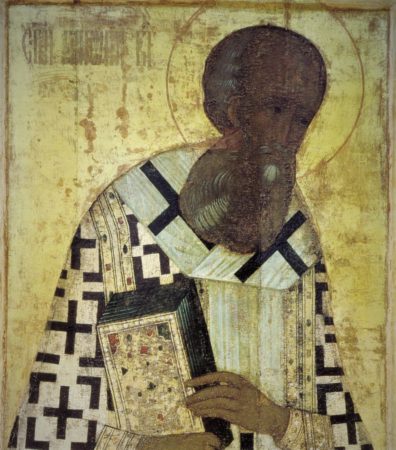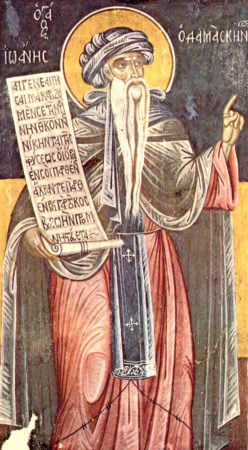Podcast: Play in new window | Download
Subscribe: Spotify | Email | RSS

Is the idea of a triune God, a tripersonal God, a Western mistake, something not seen in ancient or early medieval Eastern Orthodoxy? This is the view of Dr. Beau Branson, and of Dr. John Behr. Dr. Branson has argued that “monarchial trinitarianism,” on which the Father (not the Trinity) is the one God, is the correct understanding of trinitarian tradition, and that this is the sort of theology seen in all pre-modern (or late medieval) Orthodox theologians.
In this episode, I argue that they are mistaken in this.
While there is no such idea, I agree, in Basil, it is pretty clearly there in the work of Gregory of Nazianzus, in the ecumenical council from the year 553, and in the work of John of Damascus.
This is what one would expect to see, if I am right that this idea of a tripersonal God, the one God as the Trinity, comes into catholic theology, both east and west, in about the last quarter of the fourth century, as a development of what historians call “Pro-Nicene” theology, i.e. catholic theology done by partisans of the Nicene creed of 325 (as understood in the latter fourth century).
Links for this episode:
- Basil of Caesarea
- Gregory of Nazianzus
- Select Orations

- On God and Christ: The Five Theological Orations and Two Letters to Cledonius
- Oration on Holy Baptism
- Oration on the Holy Lights
- The Last Farewell in the Presence of the One Hundred and Fifty Bishops
- 1 Corinthians 8:4-8
- Flocanrib – a parable, Flocanrib and the ambiguity of the word “Trinity”
- 10 steps towards getting less confused about the Trinity – #8 – trinity vs. Trinity
- Constantinople II (553)
- John of Damascus
- Writings: The Fount of Knowledge- The Philosophical Chapters, on Heresies, the Orthodox Faith
- This week’s thinking music is “28 Aussens@iten” by Stefan Kartenberg.


Orthodox layman here. I believe in only one uncaused cause: the Father who causes his Son and Spirit whom I worship together with the Father. My object of worship is the Trinity while the arche anarchos is a single member of the Trinity. I’m pretty sure this is true for the fathers of the church and most orthodox christians. Whether “God” refers to the Father alone, the Trinity as a whole, each member of the Trinity or even every single divine energy a logoi or even each saint or the Trinity with the Saints depends on what you mean by “God”. If it means uncaused cause then this is just the Father. Even the RCC recognizes the Father as the cause of the Trinity and the One cause with No Cause: http://www.freerepublic.com/focus/f-religion/1822648/posts
Thanks for the comment, Symeon. I too worship the uncaused cause, the Father. And also, his Son, as we see in the NT. It would seem that you believe in 4 objects of worship, though – those plus the Spirit and the Trinity. As you say that “God” can refer to the Trinity, I take it that you think the Trinity is a god – the God – so, you’re a trinitarian in the sense I define the term, but interestingly, you must then disagree with what Dr. Branson thinks is the correct Orthodox theology of the Triad.
If we replace “divine nature” with “eternal Mind” we may get a clearer picture of what Gregory, et. al are saying, and perhaps a clearer picture of what Dr. Branson has tried to articulate. The Father produces WITHIN Himself His Son and His Spirit. (Think of it this way: the eternal Mind [Father] produces WITHIN itself a perfect self-image [Son] and perfect love [Spirit].) We may correctly say that the Father IS the eternal Mind; yet, we may also correctly say that the Son and Spirit share the eternal Mind with the Father. This is different from saying that there is only one essence (nature) of humanity, and that Clinton, Trump, and Tuggy share that one essence (nature). This particular “trinity” are three separate beings, while the three hypostases of the eternal Mind are WITHIN a single being.
Plotinus has a format like that. Logos emanating from the One.
Comments are closed.